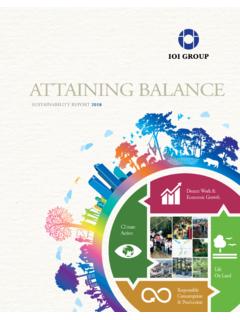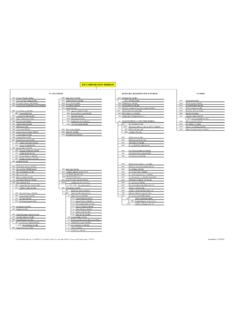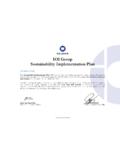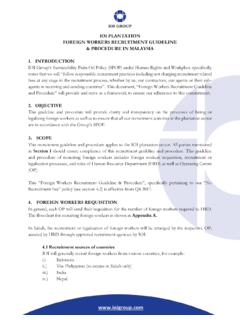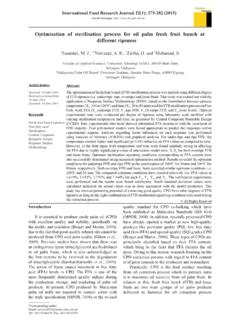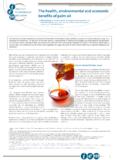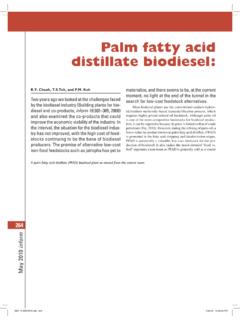Transcription of IOI Group Sustainable Palm Oil Policy
1 All Rights Reserved 2018 IOI Group Sustainable Palm Oil Policy 1. Introduction Palm oil is an important commodity; it is the most widely used vegetable oil in the world. Since palm oil plantations are labor intensive, crop production provides a livelihood to millions of people in tropical agricultural communities around the world. Of all vegetable oils, palm oil has the highest oil yield per hectare by far. Palm oil is well positioned to remain a crucial part of the food production process in the future as the global population increases, according to expectation, to 9 billion by 2050. This opportunity comes with the responsibility to implement palm oil production practices that are environmentally sound, protect forests and biodiversity, reduce greenhouse gas (GHG) emissions and respect the rights of indigenous peoples, workers and local communities.
2 We are on a journey to build a traceable, transparent, Sustainable palm oil supply chain. Our actions are guided by this Sustainable Palm Oil Policy , which is based on current best practice informed by stakeholder input. Moving forward, in consultation with our stakeholders, we will review, adjust and improve our Policy and its implementation. We will publicly disclose all implementation progress documents on a quarterly basis. 2. Scope IOI Group commits to be a leading corporation in its core businesses, and a leader in integrating the highest sustainability standards into our business practices. Specifically, IOI Group is committed to the Sustainable management of its oil palm plantations and to the implementation of responsible, global palm oil supply chains.
3 The provisions in this Policy apply to all IOI operations worldwide, including our subsidiary companies, joint ventures and companies in which we have management control. We expect all our third-party suppliers of palm oil products to adhere to our sustainability Policy commitments for their operations. We will build and maintain our internal capacity for implementation and enforcement and develop procedures for monitoring and acting on non-compliance with any element of this Policy which is identified either within the organisation or among our third-party suppliers. This Policy is effective immediately. To translate commitments into action we will concurrently publish a detailed time-bound Sustainability Implementation Plan (SIP).
4 As a working document, the SIP will be regularly updated to reflect the progress of our implementation plan. 3. Our Commitments IOI Group aims to ensure that our sustainability journey takes the company to a leadership position in both Sustainable palm oil production and sourcing. Our Sustainability Policy is based upon the following principles: To comply with all applicable legislation and codes of practice. To implement leading sustainability standards laid out in this Policy for environmental management, human rights and workplace conditions, community development and social impact. All Rights Reserved 2018 To build traceable supply chains such that all suppliers are also in compliance with our commitments as contained in our Sustainability Policy on Environmental Management, Human Rights and Workplace as well as Community Development and Social Impact.
5 To strive for the highest levels of transparency and stakeholder engagement. 4. Existing Plantations Our existing plantations in Peninsular Malaysia and Sabah (except recently acquired plantations which are covered under a time-bound plan) are 100% RSPO certified. We will now build on this by: Committing to implement RSPO NEXT in our malaysian plantations, commencing end of 2016. Certifying the outstanding management units, including Sarawak and Indonesia, in accordance with the published time-bound plan. Committing towards Sustainable production of palm oil and its continuous improvement as outlined in the malaysian Sustainable Palm Oil (MSPO) guidelines.
6 In supporting the malaysian government s target, we will ensure all our malaysian plantations are MSPO certified by the end of 2018. Implementing a labour rights monitoring system, with the involvement of an external partner to verify labor conditions, compliance with labor Policy requirements and improve welfare and working conditions. We will take meaningful corrective action to address any identified non-compliances or improper labor practices. Specific commitments in terms of our social and environmental performance, also applicable to our third-party suppliers, are identified below: Environmental management Identification and protection of High Conservation Value (HCV) areas and High Carbon Stock (HCS) forests.
7 For existing plantations on peat, appropriate management using Best Management Practices, as defined in the RSPO P&C and the RSPO manual on Best Management Practices for existing oil palm cultivation on peat. Where areas are identified as unsuitable for oil palm replanting, based on drainability assessments or other reasons, plans will be developed for the appropriate management of such areas, which could include rehabilitation. Implementation of programs to progressively reduce GHG emission, recycle/reuse palm biomass and generate renewable energy by methane capturing. Enforcement of IOI Group s no-burning Policy . No use of Paraquat and pesticides that are categorised as World Health Organization Class 1A or 1B.
8 Human Rights and Workplace Respect and uphold the rights of all workers, including contract, temporary, and migrant workers, in accordance with the Universal Declaration of Human Rights, the International Labor Organization s core conventions, United Nations Guiding Principles on Business and Human Rights and the principles of Free and Fair Labor in Palm Oil Production. Uphold the right to freedom of association and recognize the right to collective bargaining and allow trade unions to have access to our workers. Eliminate all forms of illegal, forced, bonded, compulsory or child labor and in particular, follow responsible recruitment practices including not charging recruitment related fees at any stage in the recruitment process, whether by us, our contractors, our agents or their sub-agents in receiving and sending countries.
9 No retention of workers passports/identity documents or withholding of workers wages other than that prescribed by law. All Rights Reserved 2018 Pay all workers the statutory monthly minimum wage and overtime compensation, in accordance with the current labour regulations. Provide fair and equal employment opportunities for all employees, regardless of race, nationality, religion or gender. Promote a safe and healthy working environment that is free of sexual harassment. Provide adequate equipment and training on the implementation of health and safety policies. Provide training and development to employees to ensure achievement of th eir full potential.
10 Community Development and Social Impact Drive positive socio-economic impact for local communities, as well as respect and contribute to the quality of life and wellbeing of the communities in which we operate. Engage effectively with the communities in an open and transparent manner through consultation, supported by a grievance procedure in which existing and future complaints are resolved to the satisfaction of all stakeholders. Support the inclusion of smallholders in the palm oil supply chain and help them to comply with our sustainability Policy . 5. Additional Commitments for New Plantings Sustainability commitments, in addition to those stated previously under Existing Planting , which are applicable to any new oil palm plantings by IOI and its third-party suppliers are identified below: No deforestation and protection of High Conservation Value (HCV) areas.
